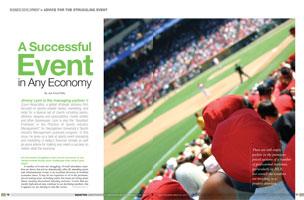
 |
| There are still empty pockets in the premium-priced sections of a number of professional stadiums, particularly in MLB, but overall teh numbers are trending in a positive direction. |
Jimmy Lynn is the managing partner of JLynn Associates, a global strategic advisory firm focused on sports-related media, marketing, and retail for a diverse set of clients including teams, athletes,leagues and associations, media outlets and other businesses. Lynn is also the "Assistant Professor in the Practice of Sports Industry Management" for Georgetown University's Sports Industry Management graduate program. In this issue, he gives us a look at sports event managing and marketing in today’s financial climate as well as some advice for making your event a success no matter what the economy.
Are all events struggling in the current economy, or are certain events facing more challenges than others (and why)?
A number of events are struggling. Overall attendance numbers are down, but not too dramatically; after all, attending sports and entertainments events is an excellent diversion in troubled economic times. It may be too expensive to sit in the premium-priced seating areas, including suites, but teams are being smart about creating discounted ticketing sections. Events that are mostly high-priced may continue to see declining numbers, but it appears we are starting to turn the corner.
I read on a regular basis that music concerts are being postponed or canceled (primarily due to lack of tickets sales) but I'm more of a sports person, so my focus is on sporting events. The U.S. is the largest and best sports economy in the world. Americans are always going to attend and support their favorite sports events. Yes, the overall numbers have been in decline recently with the downturn in the economy, but as the economy improves, the attendance figures will continue to improve.
There have been signs recently, an uptick in employment rates for example, that the economy is recovering. Have you seen evidence of this in the sports event world?
 |
| © Worakit Sirijinda - Dreamstime.com |
Yes, throughout this year the attendance numbers continue to improve across nearly all sports. There are still empty pockets in the premium-priced sections of a number of professional stadiums, particularly in MLB, but overall the numbers are trending in a positive direction.
Another important point, though: there are now more options than ever for the sports fan. MMA and Extreme Sports have seen increased popularity. Soccer is also starting to gain more traction, particularly with the success of the recent World Cup. So, there will be a fight for the family sports/entertainment dollar as the options increase.
What are the top challenges you’re seeing for today’s sports events? Decrease in attendance? Loss of sponsorship funds? Decrease in participation?
There are a number of challenges, including tickets sales and sponsorships. The tickets priced at the lower and moderate levels are doing fairly well but the premium priced tickets and suites aren't selling as well as when the times are good. Also, sponsorships across the board are down. Another area that continues to suffer is stadium naming rights deals. But, as the economy improves, ticket sales, sponsorships at sports events and even naming right deals will increase.
Participation in sports will also continue to increase. Why? One reason is that are more and more women and girls playing sports. There's no doubt about the importance of Title IX has had on women's sports over the past couple of decades. It's terrific to see women's leagues such as the WNBA, LPGA, WPS, etc succeed. Yes, the leagues might be struggling a bit, but at least there are many role models for the young girls interested in playing sports. At the college level, women's basketball continues to do well, too.
Other sports that are increasing in popularity include softball, lacrosse and field hockey. Another important factor will be the First Lady's "Let's Move" campaign to fight child obesity. Also, in conjunction, the new and improved President's Council on Physical Fitness, Sport and Nutrition will play a role in getting more youngsters involved in being more active, which will translate in greater participation in sports.
What action do you recommend to reverse (or start reversing) each of those challenges?
One recommendation is flexible/dynamic ticket pricing, particularly during games played during the middle of the week or against lesser opponents. This will help put more fans in the seats. Another recommendation is having the teams and athletes take a more active role in community service and events. These moves help increase the goodwill in the community and can translate into increased ticket sales as organizations and families appreciate the efforts being made by the teams and players.
 Advertising is a big expense, and one many events can no longer afford. Are you recommending other strategies for your events? If so, what?
Advertising is a big expense, and one many events can no longer afford. Are you recommending other strategies for your events? If so, what?
Yes, advertising can be a fairly big expense, but it's still much needed to drive brand awareness and product usage. The better route might be to take more of multi-platform approach in creating and developing the marketing plans. In particular, decrease the amount of dollars being spent on the mass media and consider implementing more social and new media elements in the marketing campaign. But, to be clear, don't transition all of the marketing dollars from traditional media to new media. Instead focus on a creating a multi-platform marketing plan.
What advice do you have for an established event that has recently begun to struggle because of the economy?
Just as I noted previously, aggressively embrace social media. Fully implement and leverage the power and capability of smart phones, mobile applications, tablet applications, etc. Use any and all of the following in creating a multi-platform strategic marketing plan: Facebook, Twitter, FourSquare, YouTube, CrowdZone, Gawalla, Groupon, Living Social, blogs, etc. Stay on top of the emerging technologies to attract new customers in a fluid and cost-efficient manner.
What advice can you offer to planners who are just embarking on the plans for a new event to help them avoid some of the most common economic land mines?
Basic straight forward business advice... for a new event in a not-so-great business environment, I'd focus on launching a smaller and more focused event, keep a keen eye on expenses and expectations and leverage new and social media as much as possible to keep the marketing expenses down.
What's the most important aspect of planning that owners can focus on to save costs and maximize the success of their events?
I probably sound like a broken record. My recommendation would be to create a multi-platform marketing plan that embraces both traditional media and new media. Traditional media allows one to reach the largest and broadest audiences, but embracing new media also allows one to reach new markets in a more cost-efficient and targeted manner. It might be a bit overwhelming at first to look at the many social media options, but it's clear that a number of them stand out as the most popular. As a professor of both graduate and undergraduate classes at Georgetown University, I'm in constant communication with over 200 students. I love to interact with the students and pick their brains on how they consume media as well as to how they're being marketed to by the brands. So, one more recommendation is to reach out to your local universities and engage with the digital media classes to see if the students can help develop a social media plan as a class project.
Find out more about JLynn Associates at www.JLynnAssociates.com.

